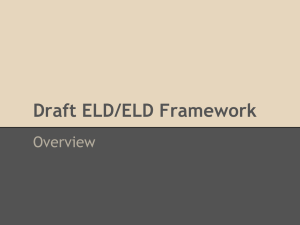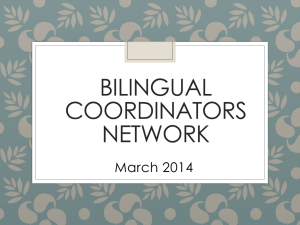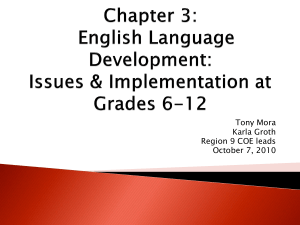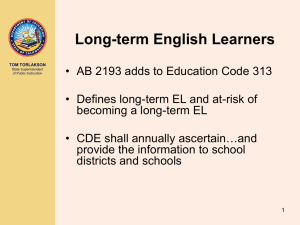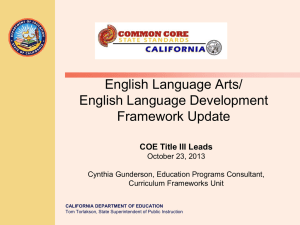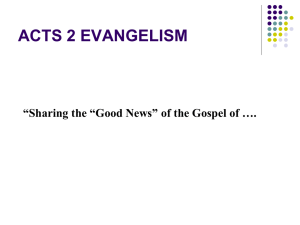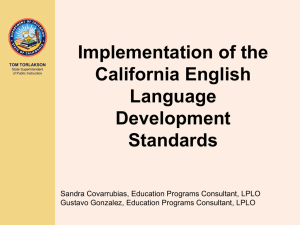July 2013 Agenda Item 8 - Meeting Agendas (CA State Board of
advertisement
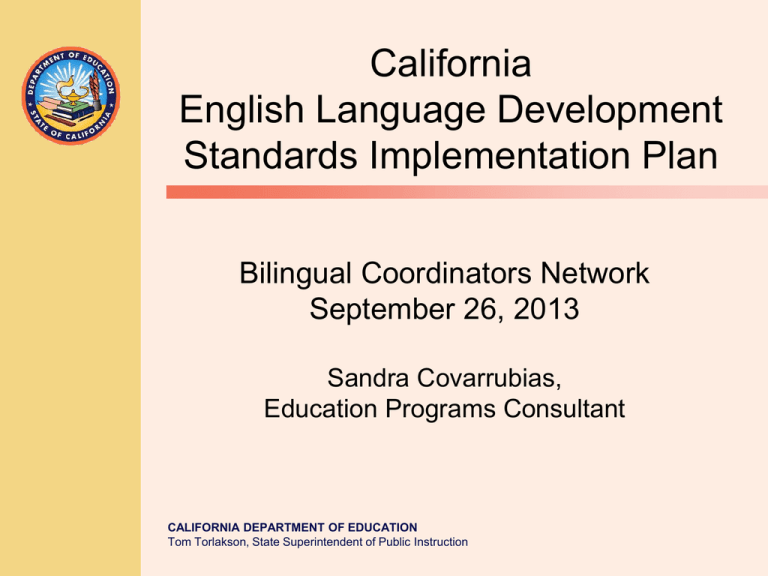
California English Language Development Standards Implementation Plan Bilingual Coordinators Network September 26, 2013 Sandra Covarrubias, Education Programs Consultant CALIFORNIA DEPARTMENT OF EDUCATION Tom Torlakson, State Superintendent of Public Instruction Assembly Bill 124 TOM TORLAKSON State Superintendent of Public Instruction The State Superintendent of Public Instruction (SSPI) and the State Board of Education (SBE), as stated in California Education Code 60811.3(e), “shall present to the Governor and the appropriate policy and fiscal committees of the Legislature a schedule and implementation plan for integrating the English language development standards . . . into the state public education system.” TOM TORLAKSON The California English Language Development Standards Implementation Plan State Superintendent of Public Instruction The California English Language Development (CA ELD) Standards Implementation Plan is a living document that will be updated as new actions, resources, and information develop. The CA ELD Standards Implementation Plan is posted online at: http://www.cde.ca.gov/sp/el/er/eldstandards.asp Purposes of the ELD Implementation Plan TOM TORLAKSON State Superintendent of Public Instruction • Integrates the new California English Language Development (CA ELD) Standards into the public school system. • Parallels the California Common Core State Standards (CA CCSS) Implementation Plan in structure with specificity for ELD. • Details the English language development standards implementation, ongoing and future, activities. • Serves as a guidance tool for local educational agencies (LEAs) by providing a structure to emulate when developing their own implementation plans. Phases of Implementation TOM TORLAKSON The plan identifies three major implementation phases that parallel the CA CCSS State Superintendent of Public Instruction • The Awareness Phase – is an introduction to and builds familiarity with the shifts to 2012 English Language Development standards • The Transition Phase – presents the need for professional development for all staff to learn about and begin implementation of the standards; align curriculum and assessments to the standards • The Implementation Phase – presents the need to identify and select materials, use standards to design and implement lessons, assess students/assess implementation Guiding Strategies TOM TORLAKSON The seven guiding strategies in the CA ELD Standards implementation plan provide the structural framework for activities and mirrors the CA CCSS Implementation Plan: State Superintendent of Public Instruction 1. Facilitate high quality professional learning opportunities for educators. 2. Provide CA ELD Standards-aligned instructional resources. 3. Develop and transition to CA ELD Standards-aligned assessment systems. 4. Collaborate with parents, guardians, and the early childhood and extended learning communities. 5. Collaborate with the postsecondary and business communities as well as additional stakeholders. 6. Seek, create, and disseminate resources. 7. Design and establish systems of effective communication among stakeholders. Guiding Strategy 1 Facilitate high quality professional learning opportunities for educators TOM TORLAKSON State Superintendent of Public Instruction • Professional Learning Modules (PLMs) for CCSS are developed and posted. These will be reviewed and updated with ELD. They will include instructional guidance on recognizing and taking advantage of opportunities to support ELs in the all content areas. • Two ELD PLMs are currently in development by WestEd PLM-A: Provides an introduction to understanding and using the CA ELD Standards to ensure English learner (EL) students have access to the CCSS for ELA/Literacy. PLM-B: Focuses on using the CA ELD Standards in tandem with the CA CCSS for ELA/Literacy during mainstream content instruction, and using the CA ELD Standards as the focal standards for designated ELD instruction. Guiding Strategy 2 Provide CA ELD Standards-aligned instructional resources TOM TORLAKSON State Superintendent of Public Instruction • Develop a list of supplemental instructional materials for kindergarten through grade eight (K-8) that provide a bridge from the CA ELD Standards to the CA CCSS ELA/Literacy for the SBE to approve by June 30, 2014. (AB 1719Fuentes). • Develop the CA ELD /CA CCSS ELA/Literacy Curriculum Framework which includes instructional guidance for programs for English learners including ELD –The ELA/ELD Framework will include criteria for developing and evaluating instruction materials aligned to both ELD and CCSS ELA/Literacy standards. –Provide a timeline for ELD/ELA aligned instructional materials adoption. Guiding Strategy 3 TOM TORLAKSON State Superintendent of Public Instruction Develop and transition to CA ELD Standards-aligned assessment systems. • The CELDT program will be analyzed and recommendations made for the alignment of the ELD standards with the assessment of the standards • Local educational agencies (LEAs) must continue to administer the CELDT as the state’s measure of English Language Proficiency for federal accountability under Title III of the Elementary and Secondary Education Act (ESEA). Guiding Strategy 4 Collaborate with parents, guardians, and the early childhood and extended learning communities. TOM TORLAKSON State Superintendent of Public Instruction • • • • Develop and disseminate tools that provide families with information about the new standards (CCSS and ELD). California Infant/Toddler Learning and Development Foundations and the California Preschool Learning Foundation are designed to be aligned to the ELA/ELD curriculum framework (2014) and include ELD foundations for preschool-aged children. The CDE will continue to collaborate with the early childhood community to promote the use of these documents. Develop and provide technical assistance to inform parents and guardians about how they can be involved in the education of their children and be active participants in assisting their children to meet the CA ELD Standards. Support professional learning for parents, guardians, and early childhood learning and integrate the CA ELD Standards into programs and activities beyond the K–12 school setting. Guiding Strategy 5 TOM TORLAKSON State Superintendent of Public Instruction Collaborate with the postsecondary and business communities as well as additional stakeholders. • To ensure that every student has the skills needed to succeed in career and college. • To enable students to be prepared to transition from high school to a successful postsecondary education and/or a career. • To provide resources for successful transition to college and career. Guiding Strategy 6 Seek, create, and disseminate resources. TOM TORLAKSON State Superintendent of Public Instruction • Identify state and federal funds currently available for use for implementation of the CA ELD Standards • Establish fiscal boundaries and timelines for the use of specific programmatic resources • Seek funding from the United States Department of Education and private educational foundations to support CA ELD Standards implementation efforts • Seek funding from state government to support implementation efforts • Review current and proposed laws related to all programs requiring CA ELD Standards implementation activities • Collaborate and work with other state level directors responsible for the development and dissemination of ELD Standards. Guiding Strategy 7 Design and establish systems of effective communication among stakeholders. TOM TORLAKSON State Superintendent of Public Instruction • • • • Utilize existing communication networks to facilitate two-way communications regarding CA ELD Standards implementation (2013) Utilize existing communication structures to apprise stakeholders of California’s ELD Standards implementation activities Conduct needs assessment to identify communication preferences of stakeholders Develop and use existing correspondence systems to disseminate news releases, media advisories, speeches, and events to apprise stakeholders of CA ELD Standards implementation activities. Appendices TOM TORLAKSON State Superintendent of Public Instruction The implementation plan also includes appendices that provide resources to support LEAs through the phases of the implementation process: • Appendix A: Local CA ELD Standards Implementation Plan Template –Suggested activities for coming Fall include: needs assessment for priorities at district and site level, support for working in grade level teams and use of ELD Professional Learning Modules and other tools. • Appendix B: County Office of Education Service Offerings –Guidance includes working with Title III Regional Leads and EL and Bilingual Coordinators to collaborate with peers in leading professional learning. • Appendix C: California Implementation Partners –Organizations CDE is currently working with directly and those identified for further outreach, this list is ongoing and can be expanded based on input and practice. Timeline TOM TORLAKSON State Superintendent of Public Instruction • September 2013: Public input on ELD Implementation Plan to CDE and final ELD Implementation Plan presented to SBE • December 2013: Final ELD plan presented to the California State Legislature Questions???? TOM TORLAKSON State Superintendent of Public Instruction For questions regarding the CA ELD Implementation Plan please contact: Sandra Covarrubias, LPLO Consultant 916-319-0267 scovarrubias@cde.ca.gov
